With your wedding day around the corner, I’m sure you’re swirling with anticipation! It’s almost time to share your vows of commitment to your partner and celebrate your love amongst those most special to you–I hope you’re soaking it in!
While this time is a whirlwind of romance and excitement, the whirlwind can quickly become stressful as well. While planning, it’s easy to let this stress take a toll on you and your sleep.
You may be thinking, “Well of course, how could I expect anything else?” It is common, but you don’t need to let sleep deprivation be your reality. Instead, I urge you to…
Prioritize Your Sleep!
Sleep is an essential aspect of your well-being and it’s crucial not to overlook it. Getting adequate restful sleep before your big day is imperative for both your physical and mental well-being.

A restful night’s sleep before your wedding ensures you wake up refreshed, energized, and ready to embrace every moment fully.
Again you might be thinking “Of course this is what I want, but is this possible?” I promise that my tips can assuage even the strongest pre-wedding jitters.
So, let’s explore the importance of sleep and how to achieve a restful night’s sleep the night before your wedding and the nights leading up to it.
The Benefits of Sleep
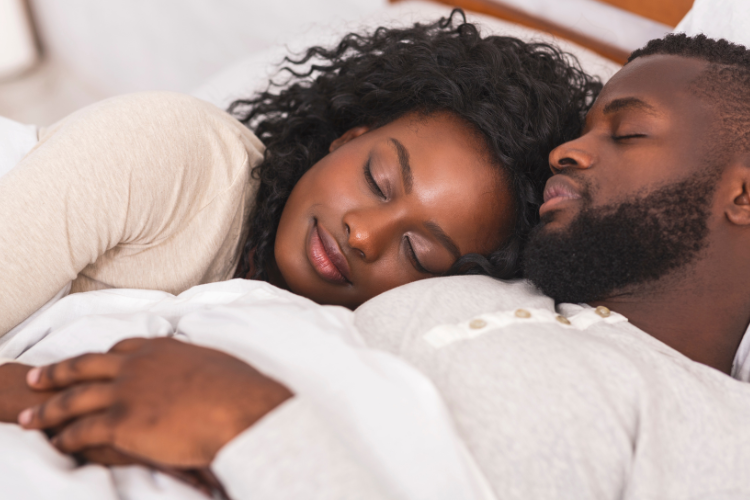
Beauty Sleep is a Real Thing!
During sleep, the body releases the hormone, melatonin, which has antioxidant properties that help fight off environmental stressors that are linked to aging.
Sufficient rest allows your skin to appear healthier, reduces puffiness and dark circles, and gives you a natural, radiant glow. 7-9 hours of sleep per night is recommended for maximum, beautifying benefits in adults—with the deepest stage of sleep occurring in the first half of the night.
The optimal time for beauty sleep is during REM (Rapid Eye Movement) sleep which occurs in the second half of the night. Achieving consistent and uninterrupted sleep throughout the entire night allows your body to repair damaged cells and tissues, leading you to feel rejuvenated and refreshed in the morning.

Rest Boosts Energy and Alertness
Planning a wedding can be physically and mentally demanding. The lack of sleep can leave you feeling fatigued, irritable, and generally low on the energy you need to tackle your to-do list. This is why it’s so important to reach each stage of sleep.
Did you know that during the third stage of non-REM sleep, also known as slow wave sleep, your body experiences the most restorative effects?
This is when your brain waves slow down, breathing becomes slower and deeper, and your body temperature drops, allowing your muscles to fully relax and repair.
During this stage your brain consolidates memories and learns new information, helping you to improve focus, concentration, and decision-making abilities—which are all so important for a productive and efficient planning process!
Sleep Supports Emotional Well-being
The nature of wedding planning can often lead to increased stress and anxiety. Sleep deprivation exacerbates these emotions and can make you more susceptible to mood swings.
Sleep supports emotional well-being in several ways, such as regulating our mood, reducing stress, and improving our ability to cope with challenging situations. Each stage of sleep supports its role.
For instance, during REM sleep, which is the stage where we dream most, our brains process emotional memories, helping us to better regulate our emotions and cope with stressors.
Maximizing the time spent in this stage of sleep can have a significant impact on your emotional state leading up to your wedding day. Making sure you are also getting enough deep sleep (the repairing stage) reduces stress and anxiety.

Focusing on your rest will allow you to approach your wedding with happiness, calmness, and ease.
How To Master a Healthy Pre-Wedding Sleeping Routine
Establish a Consistent Sleep Schedule
One of the most effective ways to get better sleep leading up to your wedding day is to build a consistent sleep schedule. Remember, ideally, adults should aim for 7-9 hours of sleep each night. This means that if you need to wake up at 6 AM, you should seek to be asleep by 10 or 11 PM to get at least 8 hours of sleep each night.
This helps regulate your body’s internal clock, making it easier to fall asleep and wake up refreshed. It can also be a very effective way to eliminate stress, as following a consistent routine promotes a sense of control and productivity, which makes it much easier to be gentle with yourself.
Create a Soothing Bedtime Routine
Establishing a nighttime, pre-bedtime routine can be a key component to promoting restful sleep leading up to your wedding. To ensure that you fall asleep easily and maintain deep sleep throughout the night, it is important to signal your body that it’s time to wind down before bed.
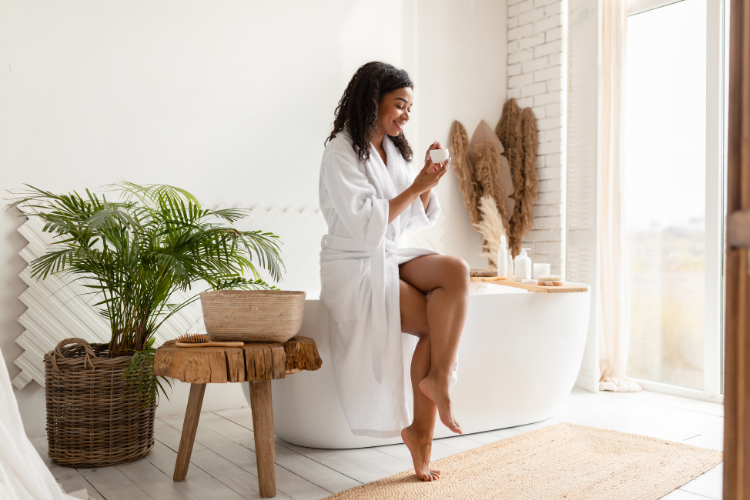
Your bedtime routine could include reading a book, taking a warm bath, or practicing relaxation techniques like deep breathing or meditation.
Aromatherapy is also helpful. Select candles or oils that promote restfulness and relaxation such as lavender, and chamomile which have been found to reduce anxiety and promote sleep. If you are burning a candle, don’t forget to blow it out before you go to sleep.
Lastly, if you are feeling anxious or stressed before bed, practicing mindfulness techniques such as deep breathing exercises can help you unwind and drift off to sleep peacefully.
Make Your Bedroom a Sleep Sanctuary
Create a sleep-friendly environment that promotes relaxation and calmness, while also minimizing distractions and noise.
Keeping your bedroom cool, dark, and quiet helps to signal to your body that it is a place for rest, making it easier to fall asleep and stay asleep for your 7-9 recommended nightly hours.
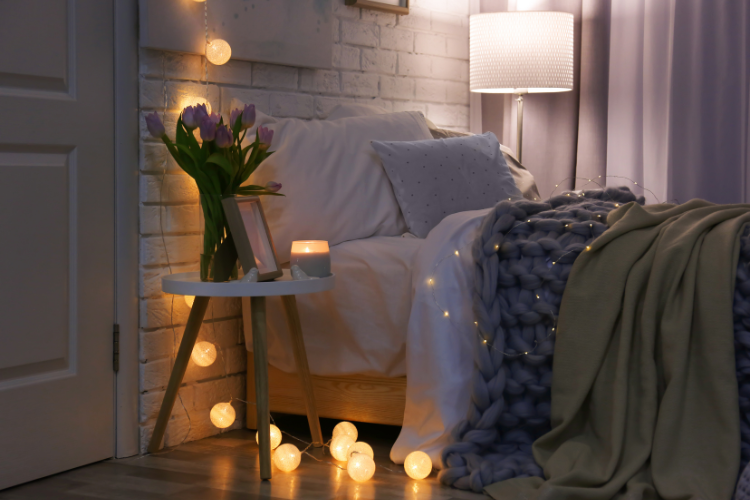
Investing in a comfortable mattress, pillows, and comfortable bedding that is conducive to temperature regulation and even selecting calming color schemes and decor that promotes relaxation, goes a long way in achieving consistent restful sleep.
Limit Screen Time Before Bed
Research has shown that the use of electronic devices close to bedtime can significantly interfere with sleep quality due to the blue light emitted from these devices. Blue light suppresses the production of melatonin, disrupting sleep and wake cycles.
Exposure to this light before bed makes it harder to fall asleep and can cause drowsiness the next day. It’s recommended to limit screen time and electronics use before bed for at least an hour, to help your natural sleep rhythm kick into gear and last throughout the night without interruption.
Avoid Stimulants and Heavy Meals
Paying attention to what you’re putting into your body is important when it comes to achieving restful sleep. Avoiding certain foods and drinks that can disrupt your sleep cycle can make all the difference in the quality of rest you’re able to get.
Limit your consumption of caffeine and alcohol, especially in the evening, and opt for healthier options like herbal teas or warm milk instead–both contain natural sleep aids like tryptophan and melatonin.
Many fruits and veggies like bananas, cherries, and leafy greens also contain sleep-promoting nutrients and can even help regulate your body’s circadian rhythm.
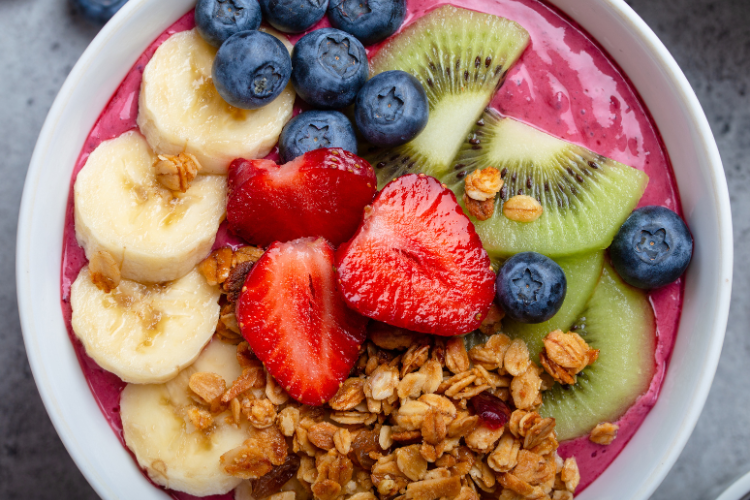
By making mindful choices about what you eat and drink before bed, you can help ensure that you wake up on your wedding day feeling refreshed and energized.
Delegate and Prioritize Tasks
While wedding planning is a very exciting task, tackling its challenges on its own can be very daunting, not to mention, sleep-depriving! Choosing to use a Wedding Planner or Day of Coordinator can lessen your burden immensely, as the finer details will not fall on your shoulders.
Trust me, I’m speaking from my 20 years of experience as both myself. That said, whether you choose to plan your wedding with professional help or not, delegating wedding planning tasks is key!
Lean on trusted family members and friends to complete each item on your to-do list one step at a time. Taking on the entire process with only your partner can be a tremendous amount of pressure.
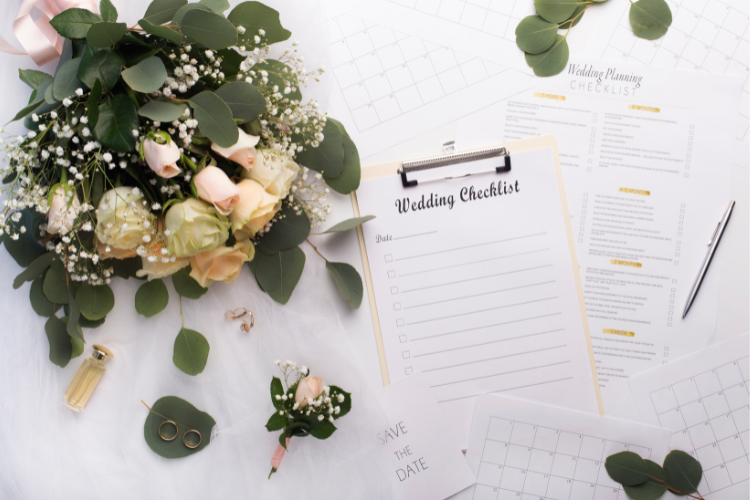
With a solid plan in place and your people in your corner to make sure everything is taken care of, you’ll be free to get the rest you need.
Remember, your wedding day is a celebration of love and happiness and the beginning of a beautiful journey!
Prioritizing adequate sleep ensures you’ll be at your best, both physically and emotionally to fully cherish every moment. By adopting healthy sleep habits and creating a peaceful sleep environment, you’ll wake up on your wedding day feeling well-rested, radiant, and ready to say “I do” with a smile.
So, embrace the importance of sleep and give yourself the gift of restful nights leading up to your special day. Sweet dreams and a lifetime of happiness await!








